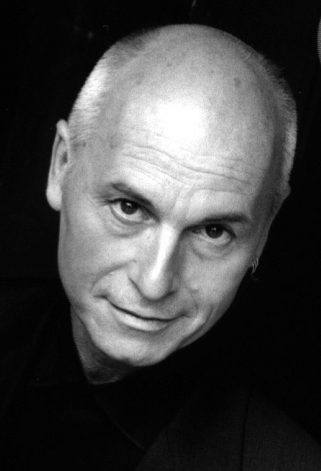Vita

Götz Naleppa
Born in East Prussia in 1943; grew up in Berlin after the war and then in Stuttgart. Studied theatre studies, German language and literature, art history in Berlin and Madrid, graduating with a doctorate in 1970 from the Free University, Berlin. Dissertation "Early forms of religious theatre in Spain; their development and remains in the present (The 'Loa' of La Alberca)".
5 years as assistant director at the Schiller Theatre, Berlin, during the directorship of Boleslaw Barlog.
Freelance work as director for theatre and radio plays, as author and translator (Spanish, English, French).
From 1970 director and dramaturge in the radio play department of RIAS-Berlin. 1977 Chief dramaturge in the radio drama department of Südwestfunk, Baden-Baden. 1978 Return to RIAS-Berlin.
In the 1970s, Naleppa was instrumental in the development of the 1TP4 radio play and the 1TP5 radio play. Through his collaboration with George Tabori, his directing work became increasingly actor-oriented. In the 1980s he turned to musical and experimental radio plays as well as sound composition.
First sound compositions since 1983, first with the Berlin sound project "Transit Communication", since the 1990s own solo works in the field of sound composition.
Teaching positions at the TU and Hochschule der Künste, Berlin; teaching and directing in Latin America.
From 1994 to 1996 he set up the radio drama departments of Deutschlandradio (Cologne/Berlin) as head of radio drama at both radio stations, founding the weekly programme "Klangkunst".
From 1996 director and dramaturge for Deutschlandradio Berlin / Deutschlandradio Kultur (responsible editor for sound art).
Götz Naleppa left Deutschlandradio at the end of 2008. Freelance work as a sound composer and director and media artist.
Götz Naleppa was jury president of the "Prix Phonurgia Nova" and "Prix Pierre Schaeffer" several times and is a permanent member of the Advisary Board of the New York Festivals.
Numerous prizes for radio play productions and sound compositions (many times radio play of the month, Prix Europa, Prix Marulic, Prix Italia 2009, "Gold Award" of the New York Festival 2008, 2014 and 2018, among others).

"Radio people"
from the Deutschlandradio programme 5/2003:
Radio? It didn't come naturally to me, at first it looked more like a theatre career: founding a school theatre in Stuttgart at sixteen, extra series at the opera, then student theatre, theatre studies, assistant director to Boleslaw Barlog at the Schiller/Schlosspark Theatre in Berlin for five years, sitting in on rehearsals of Beckett, Kortner, Schweikart, learning the theatre trade from scratch, alongside my studies and doctorate.
Then, when my teacher Barlog left, one of the many breaks in my life: away from theatre and towards the completely unknown medium of radio drama. A director's sick leave at RIAS made it possible. Which button do I press so that the actors behind the screen can hear me? Imperceptibly, the new medium seduces me away from the visual, towards hearing, towards listening. Doesn't hearing penetrate layers of the human being that are closed to the optical?
The encounter with a new great teacher was formative: George Tabori. It was the 'wild 70s' in RIAS radio drama, experiments, collages, Originalton, Kunstkopf, group work - a mirror of the turmoil of 1968. And Tabori spoke of listening, respect for the actor, curiosity and vitality. Perhaps it was only then that I became a director, as I understand the profession today. But this productive apprenticeship was made possible above all by the tolerance and humanity of the head of radio drama Gerhard Niezoldi - a non-conformist with a feel for talent and quality.
When he left, the years of training were followed by years of travelling, guest directing at many ARD stations. And then the Wall fell, and soon afterwards RIAS no longer existed. Another break. Now it was time to take responsibility, not just for a single radio play manuscript, a radio play production, but for a radio play department, first at Deutschlandfunk in Cologne, then the joint radio play editorial department in Berlin and Cologne. This meant giving up my own artistic work in favour of the 'Gesamtkunstwerk' radio play programme, building up a new department from East and West, in which everyone could learn from everyone else, exciting and exhausting. When the development was complete and the structures were in place - another break. Resignation from the management of the radio drama department, return to artistic work and, above all, concentration on a secret love: sound art, the musical side of radio drama.
Music has accompanied me almost imperceptibly throughout my professional life, from the series of extras at the Stuttgart Opera, when I heaped gold bars onto the stage for Wolfgang Windgassen in "Rheingold", to nights with Pink Floyd and the Beatles' White Album in the 1960s - to the founding of the experimental radio play formation "Transit Communication" with jazz musicians in the early 1980s. It wasn't until later that I realised how much my secret love of music played a part in each of my productions. Now the programme "Klangkunst" by Deutschlandradio Kultur, weekly 55 minutes of midnight sound compositions, boundless, outrageous. Text - sound - music? Again the familiar place between the chairs. Uncomfortable and unsuitable for falling asleep. What did Tabori always say at rehearsals: 'Stay curious! This curiosity has tended to increase with age. As has the desire to pass on what I have learnt at universities and in workshops to encourage the next generation - perhaps as a thank you to my great teachers. This idea gave rise to my favourite programme, the Newcomer Workshop, which is not dedicated to the masters of sound art, but to the unfinished, the talented, the seekers, the young noisemakers and troublemakers. Isn't restlessness the particle that keeps the clock ticking?
(Götz Naleppa)
"Magic in deeper layers"
Der Tagesspiegel from 20.12.2013
"Götz Naleppa is one of the country's best-known radio playwrights. He turns 70 on Christmas Eve. A pre-celebration in Friedenau..."
New York Festivals:
New York Festivals:

